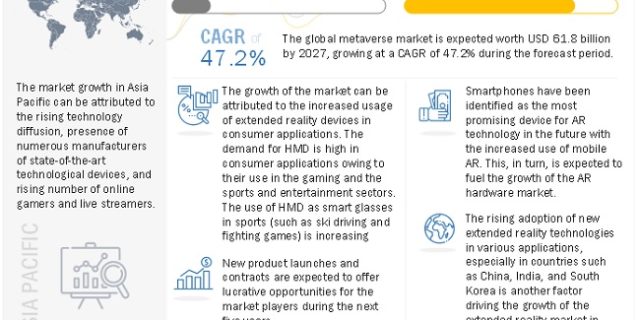
Metaverse is still in its nascent stage with multiple companies, such as Meta, Microsoft, and Google, investing in R&D to build products. The technologies involved in building and deploying Metaverse, such as AR, VR, AI, Blockchain, and 3D Design are the major areas where the companies have been recruiting for the past five years. These technologies are used to build metaverse (together), thus, they hold a high potential in talent marketplace. Further, considering the innovative nature of market, the jobs in avatar design, data bounty hunting, metaverse event management, cryptocurrency, 3D game designing, and other such innovative fields, are experiencing significant opportunities/vacancies.
Download PDF Brochure @ https://www.marketsandmarkets.com/pdfdownloadNew.asp?id=166893905
However, due to the recent economic downfall in tech sector, multiple companies have had layoffs and froze hiring temporarily. According to recent statistics, the global technology industry had more than 45 thousand employees laid off from June through August 2022. Further, considering the major layoffs from Meta in November 2022, the number has risen to more than 120 thousand for this year. With these unfavorable market dynamics, we predict that the demand for metaverse talent to reduce. However, we see a positive recovery in demand for talent in the upcoming years (post 2023).
As per MarketsandMarkets’ analysis, the demand for talent with Metaverse Market knowledge is expected to be highest in Consumer vertical followed by Commercial vertical. As per our analysis, the metaverse market for consumer vertical holds the significant market share of ~50% in 2022. Consumer segment of metaverse consists of gaming, social media, sports, live entertainment, and concerts. Further, commercial vertical, including retail & ecommerce, travel & tourism, education, and corporate holds second largest market share of ~16% in 2022. The companies from these sectors are increasingly exploring opportunities in metaverse through play-to-earn gaming, product launches, brand marketing, and immersive entertainment.
Some of the notable use cases of metaverse applications in consumer and commercial verticals include Reactland by Nike, Inc. (US), MagicBand+ by Disney (US), Mobility Adventure by Hyundai Motor Company (South Korea), and Gucci Garden by Gucci (Italy). Such companies are increasingly investing in innovative ways to use metaverse for their business excellence, which would also increase the demand for metaverse talent. The metaverse job listings have grown consecutively from late 2021 to early 2022 – around 370% increase from October 2021 to February 2022, according to a job search engine Adzuna. However, due to the recession and major layoffs, job listings are expected to decrease significantly till December 2023. However, as the economy recovers, the demand for metaverse talent is expected to grow again from early 2024. Considering the current trend and future potential of metaverse in numerous industries and applications, the global metaverse industry is expected to generate around 1.3 to 1.7 million jobs by December 2027. These jobs will mostly involve metaverse designers, hardware designers, coders/developers, and testers which will form core R&D of metaverse. Further, additional job fields with large pool of talent in metaverse would include advertising, marketing, sales, and PR. We expect majority of these jobs to be generated from market vendors catering to consumer and commercial sectors.
Request Sample Pages @ https://www.marketsandmarkets.com/requestsampleNew.asp?id=166893905
The metaverse job listings have grown consecutively from late 2021 to early 2022 – around 370% increase from October 2021 to February 2022, according to a job search engine Adzuna. However, due to the recession and major layoffs, job listings are expected to decrease significantly till December 2023. However, as the economy recovers, the demand for metaverse talent is expected to grow again from early 2024. Considering the current trend and future potential of metaverse in numerous industries and applications, the global metaverse industry is expected to generate around 1.3 to 1.7 million jobs by December 2027. These jobs will mostly involve metaverse designers, hardware designers, coders/developers, and testers which will form core R&D of metaverse. Further, additional job fields with large pool of talent in metaverse would include advertising, marketing, sales, and PR. We expect majority of these jobs to be generated from market vendors catering to consumer and commercial sectors.
Initiatives from market players:
The market vendors are also forming strategic alliances to build Metaverse and overall talent ecosystem. In October 2022, Sunovatech India entered into partnership with Thailand based metaverse developer, Translucia. Sunovatech is planning to hire 250-300 Metaverse skilled talent pool over the next year to help Translucia build metaverse environment modules, and 3D assets. Metaverse R&D center, Two Bulls, and Digital asset bank, Sygnum are also part of the coalition. With the evolution of remote and hybrid work model, employees which are majorly tech savvy Gen Z and millennials are accustomed to work remotely. This will in turn is expected to grow the demand for immersive and metaverse technologies such as augmented reality (AR), virtual reality (VR), or mixed reality (MR). From a recruitment perspective, Metaverse can also help enterprises with human connection factor. VR based job description and virtual job fairs can also make employer brands more visible and attractive to the candidates. For example, In May 2022, TCS launched Avapresence metaverse platform to enable immersive experience where employees can meet and greet and experience 3D reality. The platform integrates various advanced technologies such as blockchain, Artificial Intelligence, Extended Reality, IoT and cloud to enable the creation and operation of different Ava presence components. TCS is further partnering with other TATA companies including Tata Steel, Tata Motors, Croma and Tanishq to develop and deploy digital twins and Metaverse solutions.
Metaverse or Web3, and extended reality is expected to alter the future course of talent and skill development over the coming decade. Companies are starting to engage with metaverse use cases to build productive workforce and their own brand resulting in growing demand for skilled talent. Taking the note, market vendors are also working on innovative virtual immersive solutions to enhance workplace and workforce experience.
